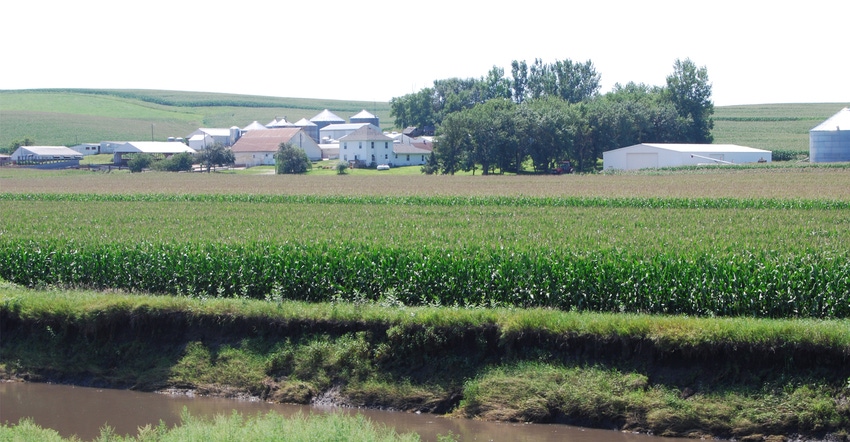July 25, 2018

Wallaces Farmer recently received a letter from a reader, asking for an explanation of Iowa law governing termination of farm leases. Following is the letter.
“At currently expected crop prices, our 2019 cash flow won’t work. Our banker wants us to talk to our landlord about lowering the cash rent on 300 acres for 2019. He wants us to notify the landlord now, before Sept. 1. By law in Iowa if either party wants to terminate or change the terms in a lease, they must notify the other party by Sept. 1 or the current lease will stay in effect.
“My son thinks if both landowner and operator agree, they can negotiate lease terms right up to planting time. He thinks we should wait to notify our landlord. His logic — if the tariff war continues, crop prices could fall further, which would strengthen our negotiating position for lower rent.
“I fear that if we do not notify our landlord now (before Sept. 1) and crop prices do sink further, our landlord could require us to pay the same rent in 2019 as we’re paying in 2018.
“Should we use my son’s strategy of waiting to attempt to negotiate when more is known about 2019 price prospects? Or should we notify the owner now, which according to the law, I believe would preserve our ability to negotiate later?
“Renting land is very competitive in our neighborhood. My son fears if we notify the owner now, we’ll be giving the owner more time to find someone who will pay more rent in 2019 than we can.”
Our answers
It is quite common for landlords and tenants to renegotiate after Sept. 1, even if the farm tenant wasn’t terminated. However, this may not always be the best option especially because the banker is advocating for termination prior to Sept. 1. Your son is correct that, as with any contractual agreement the terms of a farm lease are always negotiable if both parties consent to the terms or a change in the terms of the lease in writing. Your banker is correct, however, that if the parties do not agree on changes or the relationship breaks down, then you may be “stuck” with a higher cash rent than you can afford.
Most often, the best policy for a landowner or tenant is to strictly comply with the farm lease termination provisions of Iowa Code §§ 562.6 and 562.7 and serve the party being terminated with written notice of termination. You do that by delivery of the notice with acceptance of service to be signed by the party receiving the notice, or by serving the notice by publication, or by mailing the notice by certified mail (preferably return receipt requested).
Understanding the competitive nature of farm leasing, the best option when terminating a lease for a landlord or tenant who wishes to maintain the relationship and work toward renegotiation is to be open and honest about the situation. You may want to include a letter with the termination explaining your desire to renegotiate and the terms that would be agreeable. If you have a good relationship with the landlord or tenant, the direct approach might be the best option. Talk to the landlord in person and then put your agreement in writing.
Negotiation time
Points to ponder when renegotiating:
• Negotiate with facts in hand.
• Present realistic costs, yields and projected prices.
• Determine acceptable return on labor, machinery and management.
• Some tenants have successfully renegotiated lower cash-rental rates by using different forms of leases, including the flex-lease, which spreads the risk between landlord and tenant. Or, some go to a straight crop-share lease.
• Perhaps a tenant is willing to sign a long-term lease at a reasonable rate, spreading the risk between landlord and tenant, and “locking-in” a fair rate over the long-term.
• Landlords may be more open to renegotiation on the issue of rent when the tenant is willing to make investments in soil conservation measures.
If you hope to negotiate a lower rate, use a straightforward approach. The most useful negotiating tools are solid, hard facts. Present your landowner with current input costs, realistic yield expectations and achievable forward contracting prices for the coming year. Make a case using real figures as to why only X percent is left at the end of the season. Most landowners understand the current economics and potential margins facing farmers.
Some farmers are always looking for land to rent and will push cash rent to get it. Their actions support current cash rental rates and keep rents from coming down as fast as crop prices or land values decline. But other landlords appreciate having their current farm operator farming their land and are willing to accept less rent in the difficult financial times.
Iowa State University’s survey shows cash rental rates for Iowa farmland increased by 1.4% in 2018 after four years of continuous decline from the historical peak at $270 per acre in 2013. That’s the average for the state of Iowa, as explained in an article on page 20 in June 2018 Wallaces Farmer. The average cash rent in 2018 is still higher than the average cash rent in 2011, and only 17.8% lower than in 2013. In comparison, corn and soybean prices received by farmers in Iowa declined by more than 50% and 40%, respectively, since mid-2013.
Detailed results of ISU’s annual cash rent survey by county and crop are available in AgDM File C2-10, Cash Rental Rates for Iowa 2018 Survey on the Ag Decision Maker website. Other resources available for estimating a fair cash rent include Computing a Cropland Cash Rental Rate, C2-20, and Flexible Farm Lease Agreements, C2-21.
Herbold-Swalwell is an attorney with Brick-Gentry PC in Des Moines. Contact her at [email protected].
About the Author(s)
You May Also Like






